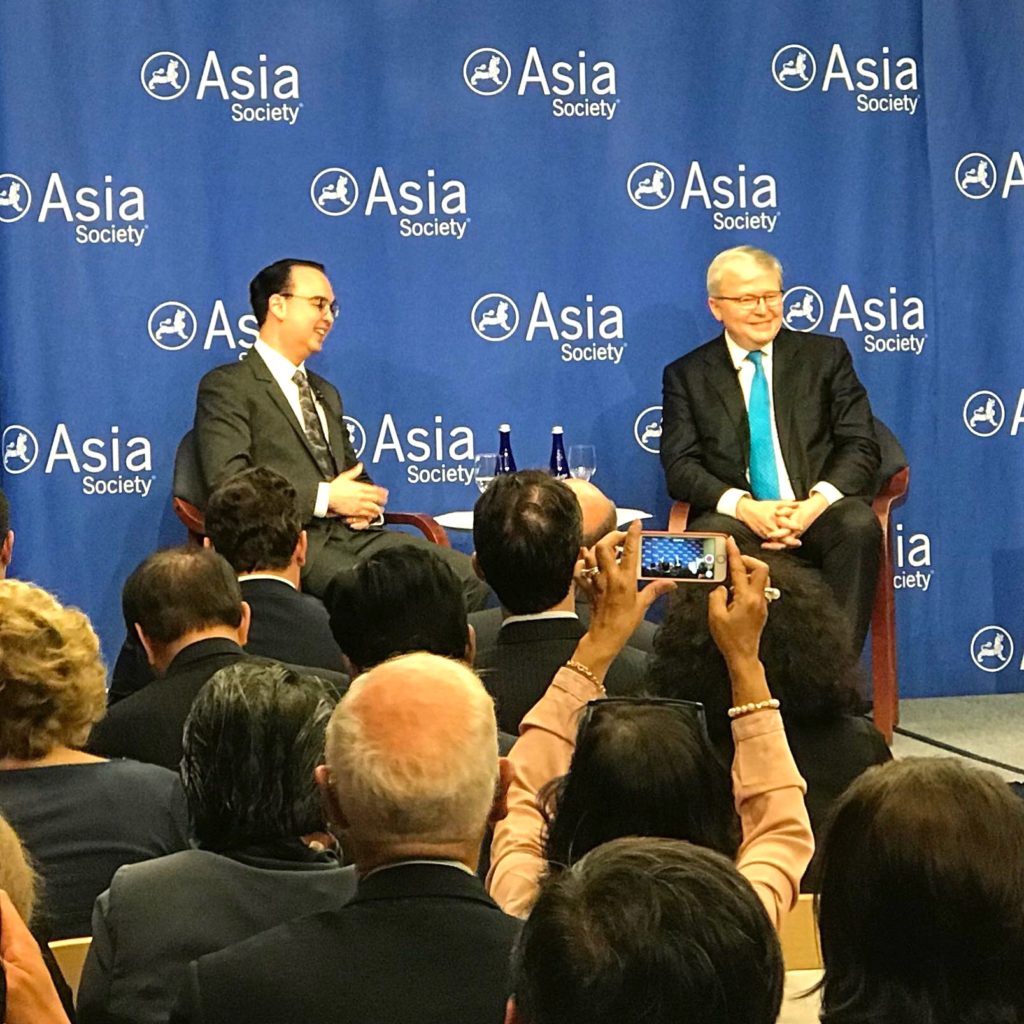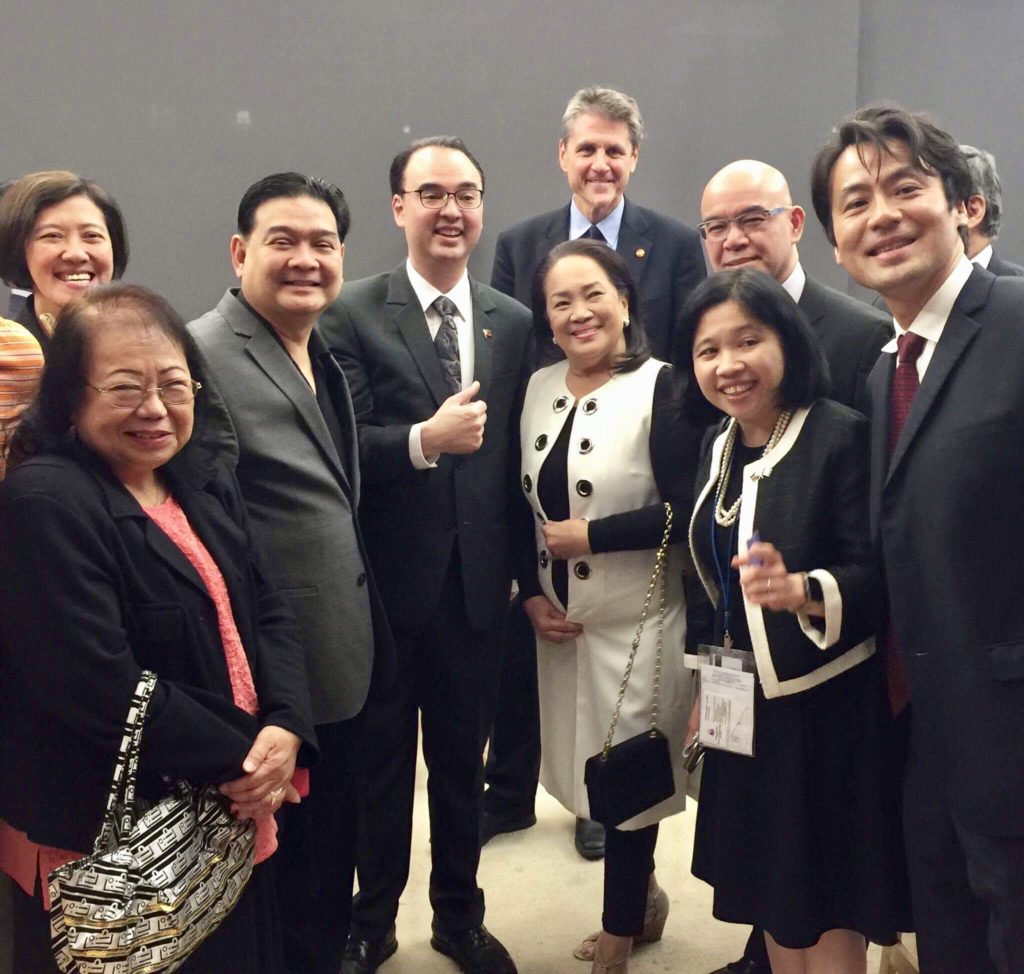In NY Cayetano defends Duterte strategy in South China Sea

Q&A with DFA Sec. Alan Peter Cayetano at Asia Society moderated by former Australian Prime Minister Kevin Rudd PHOTO BY ELTON LUGAY/ INQUIRER
NEW YORK — Contrary to popular belief, the Duterte administration asserts Philippine sovereignty over its claimed territory in the South China Sea but does so in “a more strategic manner,” according to Philippine Foreign Affairs Secretary Alan Peter Cayetano.
“Just because we don’t announce every time that may complain tayo sa China (we have a complaint against China), doesn’t mean we’re not doing anything about it,” he said in reply to INQUIRER.net’s query during a press conference held September 20 at the Philippine Consulate here.
Dismissing the premise that the Philippine government abandoned its victory at The Hague, Cayetano assured critics that the Duterte administration “will protect and fight for the Philippine interest” even as it recognizes that “there’s only so much that the government can do.”
Cayetano is in New York representing President Duterte at the United Nations 72nd General Assembly. He is also attending a number of ASEAN and bilateral meetings, according to Consul General Theresa Dizon de Vega. He took center stage at a scheduled foreign policy address at Asia Society on September 21, interacting with former Australia prime minister Kevin Rudd, who is now president of the Asia Society Policy Institute, and a largely mainstream audience.
Gaining ground
“I understand your question, but it sounds as if we’re not pursuing our claim,” he told this reporter. The question was: What will happen to the Philippine victory in The Hague over China’s territorial claim now that the government is no longer challenging China?
Cayetano insisted: “We continue to challenge all claimants in the South China Sea. We continue to assert our rights. If you look at the many papers by scholars, what was the purpose of the arbitration award? It’s very important to analyze that no one claim, not even the Philippines’, not even the Aquino administration, that territorial issues will be covered by the tribunal because the tribunal does not have the authority or jurisdiction over the territorial issues.”
Cayetano said that the government was focusing on the economic gains surrounding the Philippine claim, which tackled three issues: the 9-dash line; specific features and the entitlement of features; and how to protect such entitlements.

Flanking DFA Secretary Alan Peter Cayetano after his speech at Asia Society in New York: Asian American community leaders and members Sonia Tan (from left), Edwin Josue, Glecy Mojares, Tom Nagorski, Jerry Sibal, Consul General Theresa Dizon de Vega, and Mike Onghai. INQUIRER/Elton Lugay
One concrete gain is that Filipinos now have access to fishing grounds where they had been turned away, he said. This particular entitlement is in line with the tribunal’s ruling that recognized the traditional fishing rights of all claimants, whether Filipino, Chinese or Vietnamese.
Access to Scarborough lagoon
He pointed out that the lack of access to the lagoon in Scarborough Shoal is not an issue because the area has been designated as a marine sanctuary, which means it is a no-fishing zone, not only for Filipinos but also for the Chinese and Vietnamese.
“During the time that we confronted China each and every time in public, what happened? We were not able to enforce because the tribunal does not have any enforcement mechanisms. The U.S. has told us that they do not get involved in territorial disputes so we cannot also rely on them to enforce the decision. So by talking to the Chinese by diplomacy, what is happening now? Our fishermen now are allowed in the area,” Cayetano said.
“You would see that actually the reverse is happening. By doing this strategy, we’re actually gaining ground. So kumbaga kung tayong dalawa nag-aaway, kaninong bahay ba ‘to or kaninong kotse ba ito (if, let’s say, the two of us were fighting over who owns the house or the car), the objective remains the same, the stand remains the same. We have had the first bilateral consultative mechanism in Beijing. We’re scheduled to have the second and everyone made their claims very clear,” he added.
‘Microphone diplomacy’
Describing previous tactics as “microphone diplomacy,” Cayetano asserted that the Philippines would lose nothing with the current strategy of quiet diplomacy.
“The experts have made it clear that yung [the] laws sa [of the] land and laws of the seas are different, so just because you don’t keep repeating your claim, you will not lose your rights or the other party will not gain their rights.
“So what is happening now? It’s not a perfect situation pa rin [still]. But everyone is keeping to the features where they are already. Some are still building on those features, but everyone is following Section 5 of the Declaration of Conduct in the South China Sea, which (is no habitation).
“And why is that to our advantage? Because Malaysia, Vietnam, China are much more equipped and have much more resources to inhabit other places. So if there’s a mad rush right now to inhabit the different features, we will be diverting valuable resources that we can use for education, health, infrastructure.”
Cayetano said the Duterte administration was negotiating for the best possible Code of Conduct in the South China Sea by investing some time in building trust among the parties. It is also trying to avoid tensions by not dwelling on the tribunal ruling.
“If we started agad (right away), (is it) legally binding or hindi (not), eh kung sabihin nila hindi (what if they say it’s not), then we will be worse off—imagine with the Marawi happening, the Korean peninsula crisis. At the same time, we have to look at the South China Sea and then meron kang (there is an) ongoing rebellion with the communists and you’re trying to manage the peace process with the MILF and MNLF, there’s only so much that the government can do,” he said.
Mixed reactions
Filipino Americans had mixed reactions to Cayetano’s charm offensive in New York.
Philanthropist Jerry Sibal seems to agree with the foreign affairs secretary’s message from the Philippine president that illegal drugs, rather than the war on drugs, has eroded the rule of law in the country.
“Sec. Cayetano’s diplomatic Philippine policy speech was surprisingly good,” Sibal told INQUIRER.net. “He tackled the current important social and political problems that the country is facing with the use of animal metaphor (the elephant, the panda and eagle) in addressing these said issues. It was cleverly done. His delivery was with subtlety and very diplomatic in approach. Given that he is new in the field of foreign services, he exemplifies a young diplomat with charisma and sense of humor. These positive characteristics could be an asset for him to balance and calm down the political tensions that the Duterte administration is facing with other countries like the America, Australia among others.”
Community leader Juliet Payabyab did not agree. “The use of animals as characters in his speech didn’t sit well for me. And the Philippines was not under Mexico for 350 years. It’s Spain.”
September 23, over at the United Nations, Cayetano addressed the 72nd General Assembly with a nearly half-an-hour speech. His main message: U.N. member-states must respect Philippine sovereignty and be wary of “misinformation” on the war on drugs.
For former public school teacher Melissa Mendoza, who witnessed the speech of Cayetano at the U.N., equal access to education is the more important issue.
“The Philippine government should prioritize financial assistance to our targeted population and promote a modern school system in order to achieve better education and eventually produce a high quality of education in order to level if not to equal the opportunity with progressive countries,” Mendoza argued.
Consul General de Vega thinks the critical passages of the secretary’s speech were those on counterterrorism and the trafficking of narcotics and human beings.
“Likewise, our call for the U.N. to place migration issues high on its agenda and securing the world from weapons of mass destruction. All those issues in particular show both the commitment of President Duterte to millions of ordinary Filipinos and to the international community,” Consul General de Vega told INQUIRER.net.







